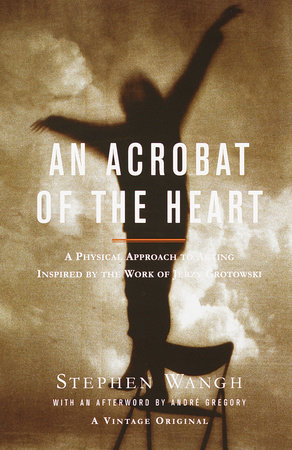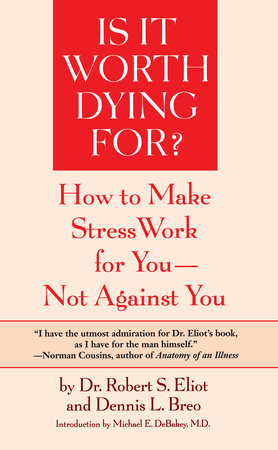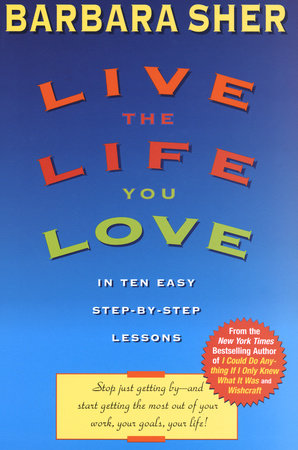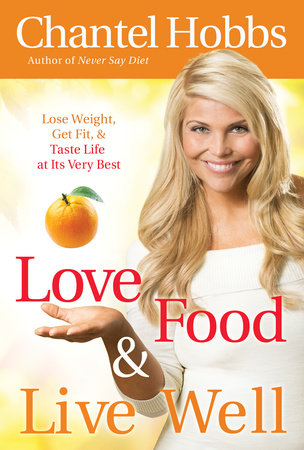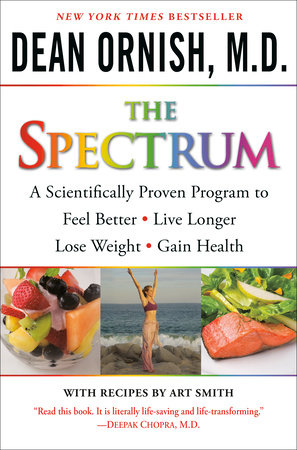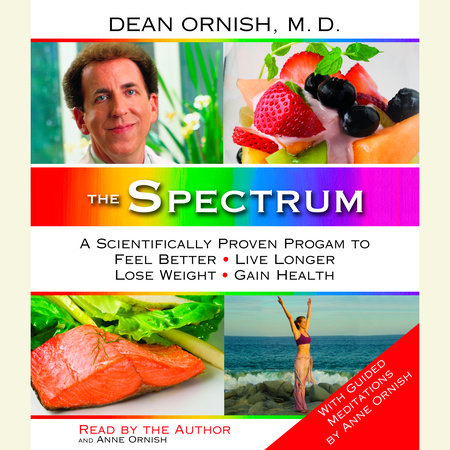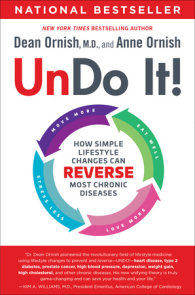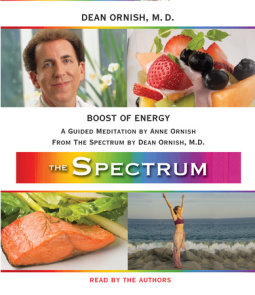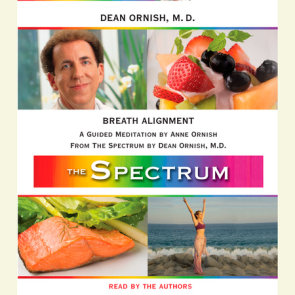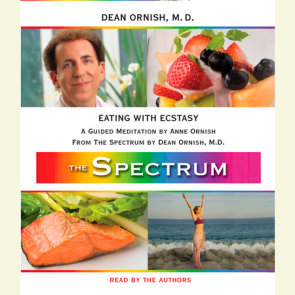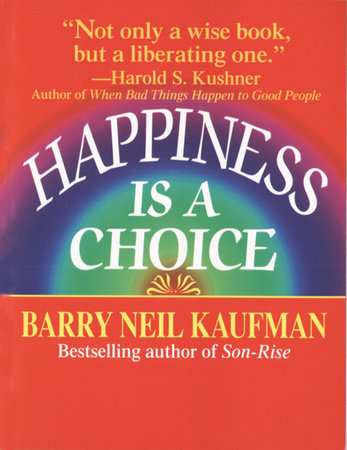Author Q&A
A Talk with Dr. Dean Ornish
First of all, why did you write THE SPECTRUM?
THE SPECTRUM is a culmination of three decades of my research and clinical experience proving what works, what doesn’t, for whom, and under what circumstances. It works.
It’s about how to enjoy life more fully while enhancing your health and well-being. The book is based on our latest research, including studies showing that you may actually be able to change how your genes are expressed just by changing what you eat and how you live. In short, this book can empower you to transform your own life.
Why do you call this book THE SPECTRUM?
I like the concept of a spectrum because it’s all about freedom. If you go on a diet, you’re likely to go off it sooner or later. For most people, being on a diet–any diet–is not sustainable. Even the word “diet” conjures up feeling restricted, deprived, controlled. If you go on an exercise program,
In contrast, THE SPECTRUM approach is all about choice. There is no diet to get on and no diet to get off. Nothing is forbidden. No “Thou Shalt Not,” no “You Better.” No guilt, no shame; no right, no wrong. THE SPECTRUM is based on love, not willpower. It’s about feeling good, not just avoiding feeling bad. Joy of living, not fear of dying.
The book shows how to cut through the confusion and to personalize a nutrition and lifestyle program just right for you based on your own needs and preferences. You have a spectrum of choices. People have different needs, goals, and preferences. The medicine of the future is personalized medicine, which this book brings to you today.
How does it work?
Here’s how: Find your place on the Nutrition Spectrum based on the foods that you tend to eat most of the time. Then, according to your own needs and preferences, decide how far, and how quickly, you want to move in a more healthful direction (if at all). In general, the farther you move towards the healthy, Group 1 end of the Spectrum, and the faster you move there, the more benefits you’re likely to gain and the more quickly you’ll experience them.
Begin by making moderate changes. If that’s sufficient to accomplish your goals, great; if not, you can make bigger ones. In our studies, we consistently found that the more people changed, the more improvements we measured and the better they felt.
If you’re healthy, you many not need or want to make very many changes at all–the “ounce of prevention.” On the other hand, if you are trying to reverse heart disease or diabetes, you’ll probably need to make bigger changes–the “pound of cure.”
Should I stop eating bad foods?
Foods are neither good nor bad, but some are more healthful for you than others. The Nutrition Spectrum consists of five groups. Group 1 is the healthiest end of the spectrum and Group 5 is the least healthful. To determine your current place on the Nutrition Spectrum, find the group that contains the foods you tend to eat most of the time. Then, according to your needs, preferences, and goals, decide how far and how quickly you want to move in a more healthful direction. For example, if you typically eat predominantly foods in Group 3, it’s easy to incorporate more foods from Groups 1 and 2, and thus move to a healthier end of the Spectrum.
(over)
We all have a full spectrum of nutrition and lifestyle choices–it’s not all or nothing. To the degree that you move in a healthful direction along this spectrum, you’re likely to look better, feel better, lose weight, and gain health. You also smell better and taste better, because your body excretes waste via your breath and perspiration.
People have different needs, goals and preferences. What matters most is your overall way of eating and living. If you indulge yourself one day, you can eat more healthfully the next.
Many people are thoroughly exasperated by the seemingly contradictory information they read about what a sound nutrition and lifestyle program should be.
Yes, and nowhere are the claims more conflicting than in the area of diet. I often hear, “Those damn doctors, they can’t make up their mind–to hell with ‘em, I’ll eat and do whatever I want and quit worrying about it!”
I understand why many people feel that way. It can be really confusing when even the experts don’t seem to agree.
The experts don’t agree?
For example, whenever I debated the late Dr. Atkins, he was usually described as the “low carb” doctor and I was the “low fat” doctor. But that was never accurate. I have always advocated that an optimal diet is lower in total fat, very low in “bad fats” (saturated fat, hydrogenated fats, and trans fatty acids), high in “good carbs” (fruits, vegetables, whole grains, legumes, and soy products in their natural forms), low in “bad carbs” (sugar, white flour), and with enough of the “good fats” (omega‑3 fatty acids) and high-quality proteins.
As a veteran of the “diet wars,” it’s time to call a truce. Rather than hearing experts bicker, most people want practical, clear, scientifically-based information they can use. Fortunately, at a time when people are more confused than ever, there is an emerging consensus about what to eat and how to live. A convergence of scientific evidence can help us resolve conflicting claims and to distinguish what just sounds good from what is proven to be true. While some significant differences remain, a greater consensus is emerging among nutrition experts than most people realize.
What about genetics? Aren’t my genes responsible?
Your genes are partly responsible, but it’s not all in your genes. I recently directed a study to find out if comprehensive changes in diet and lifestyle (i.e., the healthiest end of THE SPECTRUM) could affect how genes are expressed in men with prostate cancer and the parts of the chromosome that affect how long you live. [Note: Dr. Ornish can discuss the results of this study only after it has been published in a peer-reviewed journal.]
While you can’t change your genes, it appears that you may be able to alter how they are expressed–for better and for worse–just by changing your diet and lifestyle. We’re just beginning to understand the significance of these findings, but it is very exciting. I find this to be a profoundly hopeful message and an antidote to genetic nihilism and determinism.
Is there an exercise component to THE SPECTRUM?
You already know that exercise is good for you and that regular, moderate exercise is one of the best things you can do for your health and well-being.
What you may not know is that new research is showing that exercise beneficially affects your genes, helps reverse the aging process at a cellular level, gives you more energy, makes you smarter, and may even help you grow so many new brain cells (a process called neurogenesis) that your brain actually gets bigger. Really.
Here again is another demonstration of the theme of THE SPECTRUM: your genes are not your fate. The choices you make each day in your diet and lifestyle have a direct influence on how your genetic predisposition is expressed–for better and for worse. You’re only as old as your genes, but how your genes are expressed may be modified by exercise, diet and lifestyle choices much more than had previously been believed–and more quickly.
To gain all the health benefits of regular exercise, you don’t have to join a gym, hire a personal trainer, or organize your life around 10K’s. For example, in the Women’s Health Study, a major ongoing research project involving tens of thousands of women, those who walked briskly for just 60 to 90 minutes a week–just 15 minutes a day–cut their risk of death from heart attack and stroke in half.
Do what you enjoy, make it fun, and do it regularly. That’s it. THE SPECTRUM shows you how.
Your research shows that managing stress and enhancing emotional health are important parts of THE SPECTRUM.
Yes. Medicine today focuses primarily on drugs and surgery, genes and germs, microbes and molecules. Yet love and intimacy are at the root of what makes us sick and what makes us well. If a new medication had the same impact, failure to prescribe it would be malpractice. Connections with other people affect not only the quality of our lives but also the quantity of our lives–that is, our longevity and our survival.
Sacrifice is not sustainable. Love is. Even the word “sacrifice” conjures up austerity, deprivation, abnegation, self-immolation and other awful terms. Sustainable choices come from joy, abundance, and openness, ones that nourish and delight our hearts rather than from a place of fear and restriction.







